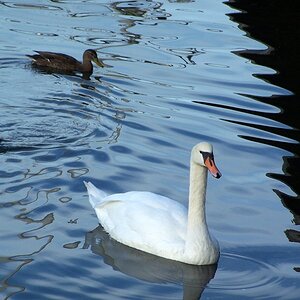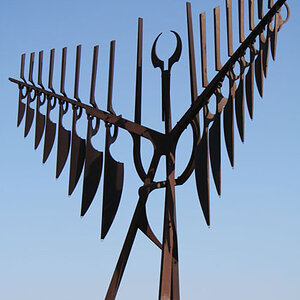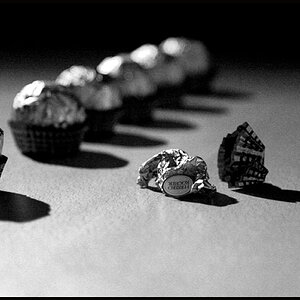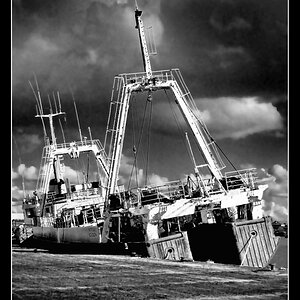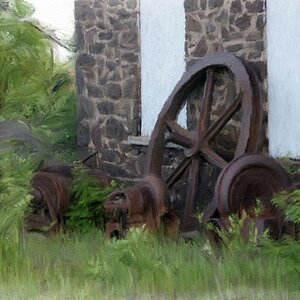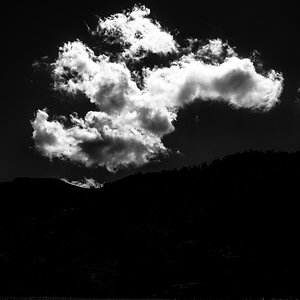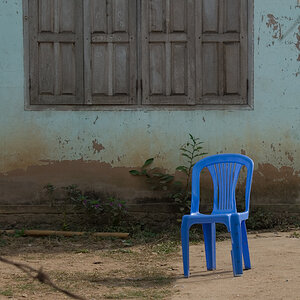mysteryscribe
TPF Noob!
- Joined
- Feb 1, 2006
- Messages
- 6,071
- Reaction score
- 3
- Location
- in the middle of north carolina
- Website
- retrophotoservice.2ya.com
- Can others edit my Photos
- Photos OK to edit
I see the same discussion comes up over and over. It is about as likely to die as arguments over who was the worst president in the last fifteen years (For the fifteen year period of your choice).
This is my outsider opinion only:
How much camera you really need on any given day will vary. If you were the perfect photographer, who only shot one kind of thing, you would only need the camera that suited your single need and nothing more. Alas that isnt the real world.
For instance, if you were just a wedding photographer and did nothing but candids with camera A. And never ever did anything else with it. And always shot them so that you never ever had to crop an image more then 2%, how large a pix count would you really need.
Change that variable. Everything is the same except you are a lousy photographer and have to crop the heck out of the image. Now how large a pix count do you need.
You are the great photographer again, but now and then you need to make an 11x14 from the image. Of course it will be the perfect image so you wont need a lot more pix than the first photographer, but you will need some.
Okay you are sloppy now and you need to make an occassional 11x14 so how big a count do you need.
You are the great photographer again and you need to make large bridal portraits or you are sloppy and still want to make them.
Do you need as much camera if you shoot landscapes as if you shoot people. The list of questions goes on.
In the days of film you could shoot 4x5 but it was inconvenient so you could shoot med format but it was expensive, now you can shoot digital with a whole new list of constraints. So how much is enough?
The worst thing about digital that I can see, and since i don't shoot it i might be whisting in the dark, is that the images really aren't quite big enough just yet to get that sloppy photographer enough pix to get the 40x60 image. And of course if you buy a camera as large as you really need it won't be enough for everything, so you have to buy an ever larger one next year. If you buy the largest one made you age going to wind up floating that famous 40k mortage we all heard about.
Camera manufacturers are in a beautiful position with digital. They can do more than just impove the light tight box with more bells and whistles. They can actually improve the guts of it. When they do that they have an honest claim that one is better than the other. So it will be like a heard of cows trudging from one field to another searching for that perfect bit of glass er grass.
I wish I had an answer to the delima but I don't. Just plan to buy new cameras every couple of years and get over it, I guess. And you thought the outlook for film was dim.
This is my outsider opinion only:
How much camera you really need on any given day will vary. If you were the perfect photographer, who only shot one kind of thing, you would only need the camera that suited your single need and nothing more. Alas that isnt the real world.
For instance, if you were just a wedding photographer and did nothing but candids with camera A. And never ever did anything else with it. And always shot them so that you never ever had to crop an image more then 2%, how large a pix count would you really need.
Change that variable. Everything is the same except you are a lousy photographer and have to crop the heck out of the image. Now how large a pix count do you need.
You are the great photographer again, but now and then you need to make an 11x14 from the image. Of course it will be the perfect image so you wont need a lot more pix than the first photographer, but you will need some.
Okay you are sloppy now and you need to make an occassional 11x14 so how big a count do you need.
You are the great photographer again and you need to make large bridal portraits or you are sloppy and still want to make them.
Do you need as much camera if you shoot landscapes as if you shoot people. The list of questions goes on.
In the days of film you could shoot 4x5 but it was inconvenient so you could shoot med format but it was expensive, now you can shoot digital with a whole new list of constraints. So how much is enough?
The worst thing about digital that I can see, and since i don't shoot it i might be whisting in the dark, is that the images really aren't quite big enough just yet to get that sloppy photographer enough pix to get the 40x60 image. And of course if you buy a camera as large as you really need it won't be enough for everything, so you have to buy an ever larger one next year. If you buy the largest one made you age going to wind up floating that famous 40k mortage we all heard about.
Camera manufacturers are in a beautiful position with digital. They can do more than just impove the light tight box with more bells and whistles. They can actually improve the guts of it. When they do that they have an honest claim that one is better than the other. So it will be like a heard of cows trudging from one field to another searching for that perfect bit of glass er grass.
I wish I had an answer to the delima but I don't. Just plan to buy new cameras every couple of years and get over it, I guess. And you thought the outlook for film was dim.


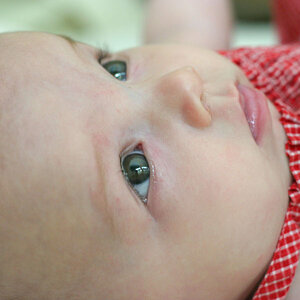

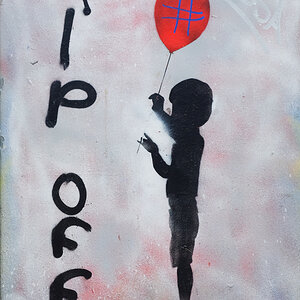
![[No title]](/data/xfmg/thumbnail/31/31046-f1d28c614676726741e90ce5b420a03e.jpg?1619734586)
